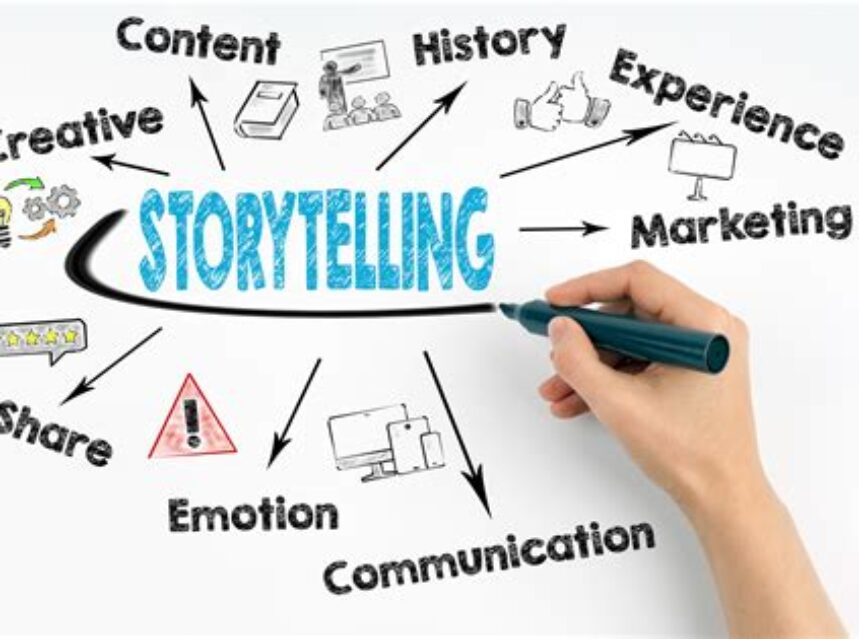The Power of Storytelling in Effective Content Marketing Strategies

Learn how to incorporate storytelling into content marketing, craft compelling narratives for brand messaging, and measure the success of storytelling campaigns for audience engagement.In the world of content marketing, storytelling has proven to be a powerful tool for connecting with audiences on a deeper level. From incorporating storytelling into brand messaging to measuring the success of storytelling campaigns, its impact cannot be understated. This blog post will delve into the various aspects of storytelling in effective content marketing strategies. We will explore how storytelling can be utilized to engage and connect with an audience, the methods for crafting compelling narratives that resonate with consumers, and the ways in which emotional storytelling can elevate brand messaging. Additionally, we will discuss the importance of measuring the success of storytelling campaigns and how it can inform future content marketing efforts. By understanding the power of storytelling and its impact, businesses can create more meaningful connections with their target audience and ultimately drive greater success in their marketing endeavors.
Understanding the impact of storytelling
Storytelling has a profound impact on human emotions and cognition. When storytelling is used effectively, it can capture the audience’s attention, evoke empathy, and drive action. Whether it’s a personal anecdote, a brand’s history, or a fictional narrative, stories have the power to resonate with people on a deep level.
Moreover, storytelling is not just a tool for entertainment, but also for education. Through stories, complex ideas can be simplified and made more relatable. This can be especially powerful in content marketing, as brands can communicate their values and offerings in a way that is compelling and memorable.
Additionally, storytelling has the ability to create a sense of connection and community. When people hear stories that they can relate to, they feel understood and validated. This can be a valuable asset for brands looking to foster a loyal and engaged audience.
Overall, the impact of storytelling is far-reaching and multifaceted. By understanding the power of storytelling, individuals and businesses can leverage it to create meaningful connections, drive engagement, and achieve their goals.
Incorporating storytelling into content marketing
Incorporating storytelling into content marketing can be a powerful tool for brands looking to connect with their audience on a deeper level. By weaving narratives into their marketing material, companies can create more meaningful and memorable experiences for their customers.
Storytelling allows brands to humanize their message and make it more relatable to their audience. Instead of bombarding consumers with dry information, businesses can use compelling narratives to evoke emotions and create a lasting impression.
When done effectively, incorporating storytelling into content marketing can help brands stand out in a crowded marketplace. It allows companies to differentiate themselves from competitors and build a loyal following of customers who resonate with their brand story.
Furthermore, storytelling in content marketing enables brands to communicate their values and mission in a way that resonates with their target audience. By crafting stories that align with their brand identity, businesses can build a stronger connection with their customers and foster brand loyalty.
Crafting compelling narratives for brand messaging
When it comes to brand messaging, compelling narratives play a crucial role in capturing the attention of consumers and building a strong connection with the audience. Crafting these narratives requires a deep understanding of the brand’s values, goals, and target audience, as well as the ability to engage the audience on an emotional level.
One of the key elements of crafting compelling narratives for brand messaging is the use of authentic storytelling. Authenticity is essential in today’s digital age, where consumers are constantly bombarded with marketing messages. By telling genuine and relatable stories, brands can establish trust with their audience and differentiate themselves from competitors.
Another important aspect of crafting compelling narratives is ensuring that the brand’s message is consistent across all marketing channels. Whether it’s through social media, advertising, or content marketing, the brand’s narrative should be cohesive and reinforce the brand’s identity.
Lastly, measuring the success of these narratives is crucial for brand messaging. By using data analytics and customer feedback, brands can gain valuable insights into the impact of their storytelling efforts and make necessary adjustments to improve their narratives.
Utilizing emotional storytelling for audience engagement
Emotional storytelling is a powerful tool for captivating an audience and creating a strong connection with them. By incorporating emotions such as empathy, joy, sadness, and excitement into your storytelling, you can trigger a response from your audience that compels them to engage with your brand or message.
When crafting a story with emotional resonance, it’s important to identify the emotions you want to evoke and understand the values and experiences that resonate with your target audience. By doing so, you can tailor your storytelling to align with the emotions and experiences your audience can relate to, making your message more impactful and memorable.
Utilizing emotional storytelling can also humanize your brand, making it more relatable and approachable to your audience. By sharing stories that evoke emotions, you can build a sense of trust and connection with your audience, ultimately leading to greater engagement and loyalty.
Measuring the success of emotional storytelling campaigns can be done through monitoring audience responses, such as social media interactions, shares, and comments. By analyzing these responses, you can gauge the impact of your storytelling efforts and make adjustments to further enhance audience engagement.
Measuring the success of storytelling campaigns
When it comes to evaluating the effectiveness of storytelling campaigns, it’s important to look at several key metrics. One of the first metrics to consider is engagement. This can be measured through metrics such as click-through rates, time spent on page, and social media shares. These metrics provide insight into how well the audience is connecting with the story being told. Another important metric to consider is brand awareness. This can be measured through brand mentions, search volume for branded keywords, and direct traffic to the brand’s website. These metrics indicate the extent to which the storytelling campaign is reaching and resonating with the target audience.
Additionally, it’s crucial to assess the impact on sales. This can be measured through conversion rates, revenue generated from the campaign, and customer feedback. These metrics show how the storytelling campaign is influencing consumer behavior and driving business outcomes. Finally, it’s essential to evaluate the long-term effects of the storytelling campaign. This may involve tracking customer loyalty, repeat purchases, and overall brand sentiment over time. These metrics give a comprehensive view of the lasting impact of the storytelling campaign on the audience.
By examining these key metrics, brands can gain a clear understanding of the success of their storytelling campaigns. Furthermore, these insights can inform future storytelling efforts, helping to refine and optimize the storytelling strategy for even greater impact.
Measuring the success of storytelling campaigns is essential for brands looking to harness the power of storytelling to connect with their audience and drive meaningful results.
Frequently Asked Questions
What is the role of storytelling in content marketing?
Storytelling in content marketing helps to engage and captivate the audience, making the brand message more memorable and impactful.
How does storytelling contribute to building brand identity?
Storytelling adds personality and humanizes the brand, creating emotional connections with the audience and shaping the brand’s identity.
What are some key elements of a compelling brand story?
A compelling brand story includes a relatable protagonist, a challenge or conflict, a journey, and a resolution that aligns with the brand’s values.
How can storytelling be used to communicate brand values and mission?
Storytelling allows brands to convey their values and mission in a more engaging and authentic way, fostering a deeper connection with the audience.
What are the benefits of using storytelling in content marketing?
The benefits of storytelling in content marketing include increased brand awareness, higher audience engagement, improved brand loyalty, and differentiation from competitors.
How can businesses incorporate storytelling into their content marketing strategy?
Businesses can incorporate storytelling by identifying their unique brand story, integrating it into various content formats, and consistently sharing it across different channels.
Can you provide examples of successful brands using storytelling in their content marketing?
Successful brands like Nike, Apple, and Airbnb have effectively used storytelling to connect with their audience, communicate their brand values, and create a lasting impact through their content marketing efforts.


